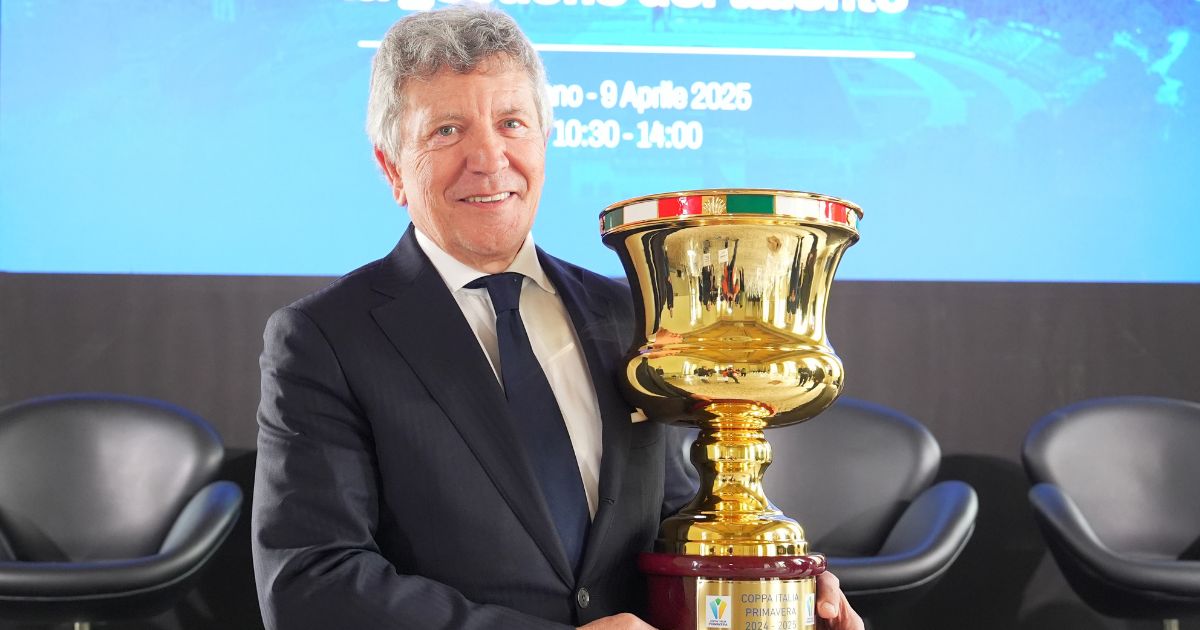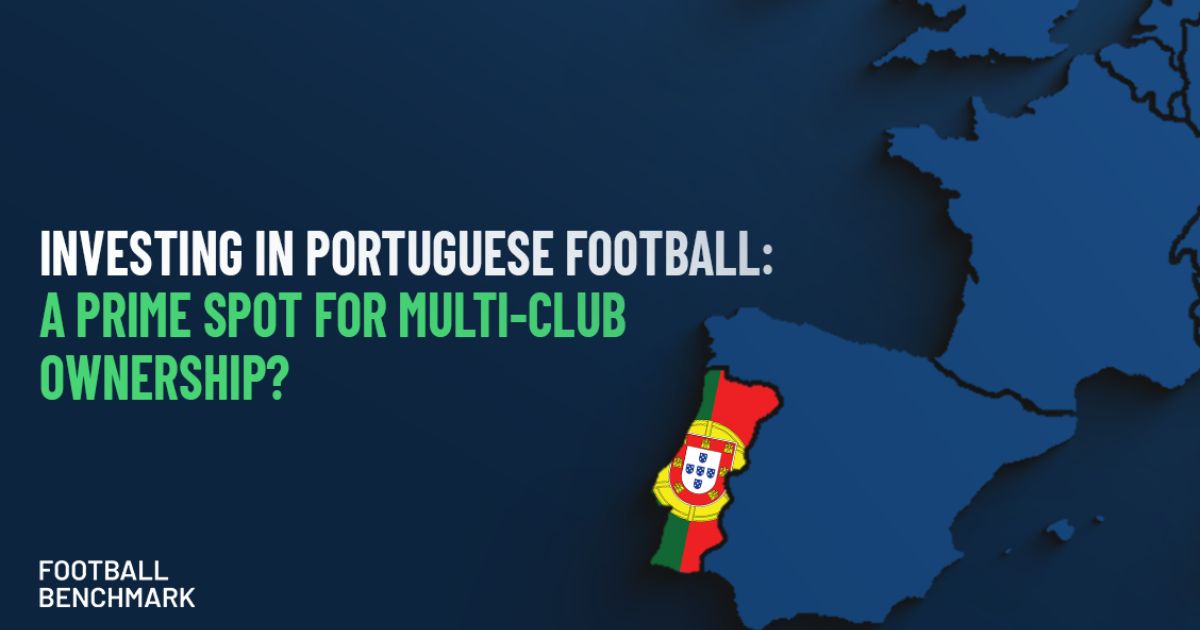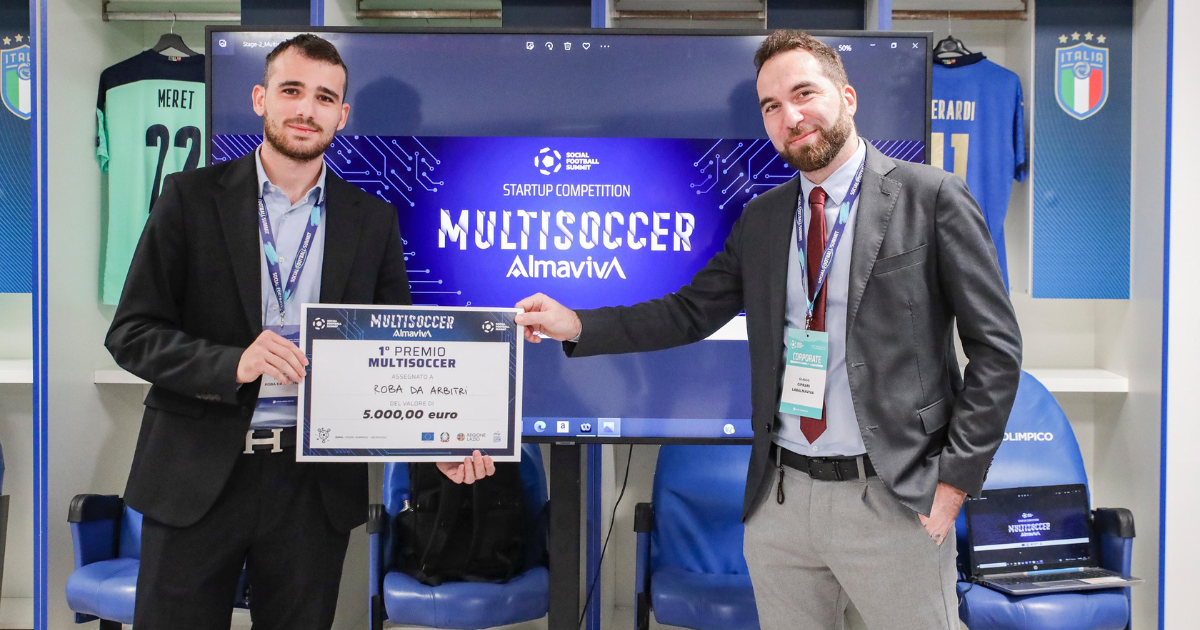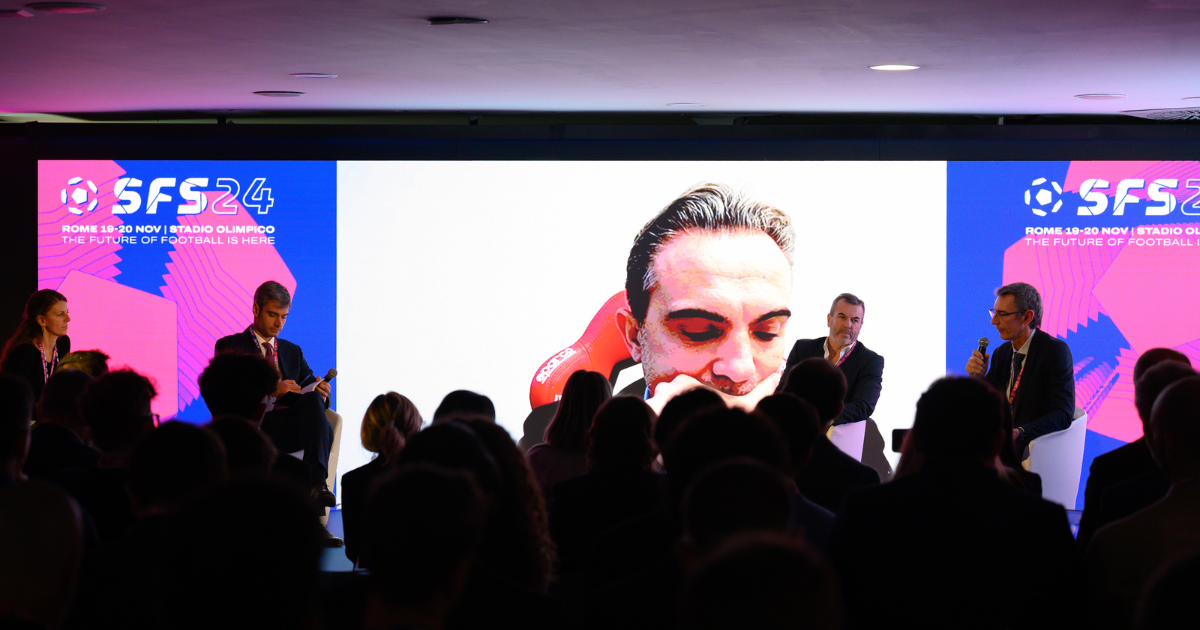The conference, organized by Lega Serie A in collaboration with SFS, was held before Milan-Cagliari, the Primavera Coppa Italia Final.
Yesterday morning, in the prestigious setting of the Palazzina Appiani inside the “Gianni Brera” Civic Arena in Milan, the conference “From Youth Football to the Football of the Grown-ups – The Management of Talent“ was held, organized by Lega Serie A and the SFS, on the occasion of the 2024/2025 Primavera Italian Cup Final. The meeting was an opportunity to take stock of the state of Italian youth soccer and the key role played by the Federation, clubs and coaches in the education of youngsters and the enhancement of the technical and human qualities of individuals.
The event, moderated by Sportitalia journalist Giada Giacalone and Rai journalist Emilio Mancuso, opened with greetings and welcome to all present by Lega Serie A President Ezio Simonelli and Milan City Council’s Councillor for Sport, Tourism and Youth Policies Martina Riva.
SIMONELLI: “Welcome to everyone here and thanks to Milan Mayor Sala and Councillor Riva for allowing us to play at the Arena. It is a great privilege to play a match of our youth competition here, the Arena smells of history, the first match of the National Football Team was played here in 1910, and as a League we are pleased that this beautiful facility becomes the institutional home of the Primavera Italian Cup. The enhancement of the nurseries is crucial for Italian soccer, at the youth level with the national teams we have achieved extraordinary results, we have won a lot, these are signs that the talent is there. Unfortunately, however, sometimes great talents are lost and we need to understand why, so that today’s champions can become the ambassadors of Italian soccer in the future in the world. I have also talked about these issues with the government, hopefully incentives will be given to teams that work with youngsters and invest in infrastructure.”
RIVA: “The City of Milan considers the Arena available for the Primavera Italian Cup Final, you will always be welcome. Talent management is at the heart of our city’s power. Young people struggle to be valued in our country, not only in soccer. Instead, we need to invest in talent, inserting new energies. The City of Milan aims to enhance the value of institutions and associations that enhance talent, train coaches and educators, and organize activities for the disabled. I find it right to give incentives to those who train young people, soccer does an extraordinary job in this, it has great social value and in Milan it will always be protected.”
After the institutional speeches, FIGC Youth National Teams Coordinator Maurizio Viscidi and the Technical Commissioners of the Italian Youth National Teams, Carmine Nunziata, Bernardo Corradi, Alberto Bollini and Daniele Franceschini told “The National Team of the future: the great successes of the Italian Under Teams.“, illustrating the path taken in the National Team for the growth and training of young people, which has led to the achievement of extraordinary sports results.
VISCIDES: “It is a great pleasure to be here today to talk about the youth achievements that have been made, but more importantly to illustrate the great work that has been done in recent years to be able to consolidate and replicate the victories in the future. At the national level, synergy with leagues and clubs is crucial, international competitions then help the growth of boys in other respects. Before the pandemic we were vice-champions so many times, afterwards we have realized a series of vitors and achieved incredible results. Suffice it to say that in 2015 we were ranked 20th, now we are second. In the youth sector, the work never ends, and we should not talk about spending, but investing. If we had not invested in young people, we would never have achieved these results.”
Federal President Gabriele Gravina, before beginning his speech to outline the work done by the FIGC in the “Enhancement and development of talent“, received as a gift a celebratory plate, delivered by Lega Serie A President Simonelli, to commemorate the first ever match of the Italian national soccer team, played back in 1910 against France, won 6-2.
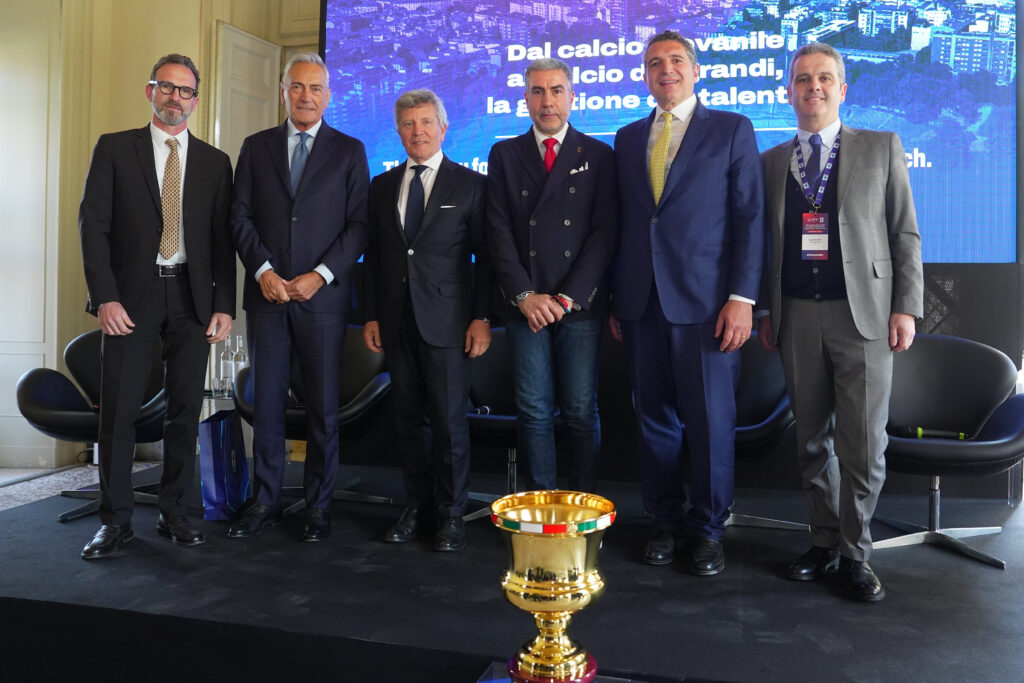
GRAVINA: “I am happy to be here in this beautiful location, a symbolic place of Italian soccer because the history of our national team began here. It is a very special day, and I thank President Simonelli, CEO De Siervo, and the entire League structure for the attention given to a crucial issue for Italian soccer, which is the development of talent. Investment in young people is no longer a choice, but a real necessity. Politics in young people pays off over time, and that is what is happening with us. I would also like to thank Club Italia for their extraordinary work with the boys and girls, which enabled them to hit historic results. The responsibility to develop talent does not fall on the clubs alone; it is the responsibility of the system. We need to take the best of the young people, making them have fun, abandoning the exaggerated idea of tactics. We need to give kids back the desire to play and have fun, and our educators need to get back to doing that, because that is the only way we can develop skills that are needed to foster the development of top players. Together with the clubs, we have rediscovered a spirit of cooperation that is in the best interest of Italian soccer.”
Empoli President Fabrizio Corsi, Atalanta’s Head of Youth Sector Roberto Samaden, along with former coach Andrea Stramaccioni and Sportitalia Director Michele Criscitiello then explained the steps to take to make “The big step: from youth soccer to big league soccer“, recounting the daily work done by clubs in the growth and training of youngsters.
The morning concluded with speeches by SFS Founder Gianfilippo Valentini and Lega Serie A CEO Luigi De Siervo, who thanked the League’s structure, coordinated by Head of Competitions Andrea Butti, for their work in organizing an official match at the Milan Arena, Italy’s oldest sports facility and among the oldest in the World.
In the pre-match of Milan-Cagliari, moreover, Lega Serie A CEO De Siervo presented the“Future Award” to Milan forward Francesco Camarda, born in 2008, who made history by becoming the youngest ever player to make his Serie A debut and the youngest Italian to take the field in the UEFA Champions League.
DE SIERVO: “I thank Andrea Butti and the entire Lega Serie A team for organizing this event in a very short time, we are very happy that the Arena has become the official home of the Primavera Italian Cup. Today’s conference was a very important moment of discussion; it is clear and evident that we are all working toward one goal. As Lega Serie A, having closed the sale of audiovisual rights for the next few years, we will now have more time to devote to our Primavera competitions, the focus of our development plan. There are already the first sponsors dedicated to Primavera, more will come, and we are working to bring more and more people into the stands to watch the boys’ games. We need to work in synergy to raise the level of youth sectors, as President Gravina said the Enhancement of nurseries is a necessity. Therefore, we must make a virtue out of necessity, working compactly and planning in detail the path forward.”
VALENTINI: “Today we had the opportunity to reiterate how crucial it is to invest not only in the technical talent of our young players, but also in their personal, cultural and value growth. The transition from youth to professional soccer is a delicate and crucial moment, requiring a structured network made up of expertise, vision and passion. With SFS we work to create opportunities for dialogue such as this one, where institutions, clubs, coaches, and the media can confront each other and build together a more sustainable and inclusive future for our soccer. This with Lega Serie A, is the confirmation of a collaboration that is consolidating strengthening more and more, with the common goal of contributing concretely to the improvement of the world of soccer, at every level.”
“FROM YOUTH FOOTBALL TO BIG-TIME FOOTBALL: TALENT MANAGEMENT”
The conference, organized by Lega Serie A in collaboration with SFS, was held before Milan-Cagliari, the Primavera Coppa Italia Final. Yesterday morning, in the prestigious setting of the Palazzina Appiani inside the "Gianni Brera" Civic Arena in Milan, the conference "From Youth Football to the Football of the Grown-ups - The Management of Talent" was held, organized by Lega Serie A and the SFS, on the occasion of the 2024/2025 Primavera Italian Cup Final. The meeting was an opportunity to take
Discovering Jean-Louis Dupont, the Architect of the Historic Bosman Ruling
Discovering Jean-Louis Dupont, the Architect of the Historic Bosman Ruling The man who, wearing the judicial robe, has revolutionized the features of global football on two distinct occasions. The Belgian lawyer will be one of the speakers at the SFS Snack in Brussels. The football lawyer. We can define Jean-Louis Dupont like this, but summarizing such an influential personality with three words would even be reductive. His figure is closely linked to two watershed events in the football context: the Bosman ruling
Investing in Portuguese football: a prime spot for Multi-ClubOwnership?
Analysis by Football Benchmark 1. Portugal boasts a strong player development ecosystem, with elite academies consistently producing high-value talent that moves to Europe’s top leagues.2. The country’s historical and linguistic ties to some areas of South America and Africa provide a competitive edge in scouting and integrating emerging talent.3. Favourable regulations, including unrestricted recruitment of non-EU players, enhance Portugal’s appeal as a key market for international talent development.4. The relatively low acquisition costs of Portuguese clubs, coupled with expected revenue growth
Premier League’s Green Revolution: ESG, Innovation and Passion for Football
During an engaging panel organized by SFS24, industry experts and managers examined the crucial role of sustainability in soccer, focusing on how Premier League clubs are adopting environmental, social and governance (ESG) strategies to innovate and transform their operating model. The panel featured prominent figures such as Tom Harris, Sustainability Manager Brighton & Hove Albion FC; Chris Goodwin, ESG Manager Chelsea FC; Caroline Carlin, Head of Clients and Sustainability Enovation Consulting; and Kelsey Francis, Senior ESG Reporting and Communications Manager also
SFS SNACK BRUSSELS – Football and Europe: rules, rights and priority
In the prestigious setting of the European Parliament, a symbolic venue for decisions that shape the future of Europe, on 26 March from 16.30 to 18.30 the SFS Snack Brussels, entitled "Football and Europe: rules, rights and priority",presents itself as a key event for debating the governance of European football. At a time of profound regulatory transformations and global challenges, this event offers a unique opportunity to bring together institutions, experts, and key industry players to outline effective strategies for
Football from a global perspective: strategies, challenges and opportunities of the new digital era
Football is undergoing an unprecedented transformation, extending into new markets and reaching fans around the world. In the SFS panel'Globalization of football: how football is expanding into new markets,' industry experts discussed the strategies, challenges and opportunities that are driving the globalization of the game. Speaking on stage, moderated by Didem Dilmen , Director Of Communications Comparisonator, were Carolina Tha, Country Manager ITA, ES, PT and CH SambaDigital, Lucas Bugter, Director of Business Development 433 and Nicole Pike,
Ref House, Refereeing 4.0: From SFS22 to the New Rules of the Game
Giuseppe Totaro and Rasoul Abdulzahra are two referees ready to revolutionize one of the most controversial categories, often at the center of debates and headlines in major media. We at SFS know them well: they were awarded during the 2022 startup competition when their creativity and innovative vision already stood out. Today, the spotlight is on them again, thanks to Ref House, an ambitious project now close to its big launch. We reached out to Giuseppe, who gave us an
“Football. But French”: The Ligue 1 Rebranding and the Challenge of Sporting Identity
French football has decided to change its look. With the launch of the "Football. But French." campaign, Ligue 1 has embarked on an ambitious rebranding operation aimed at redefining its positioning in the international football landscape. This is not just a new visual identity—it is a cultural statement. French football seeks to be distinctive, elegant, and authentic, without following the narratives set by other top European leagues. The New Visual Language of Ligue 1 One of the most striking changes is the
The stadium of the future: business, technology, and relationships in an evolving ecosystem
The modern stadium is no longer just a simple arena dedicated to sports but a continuously evolving ecosystem capable of integrating business, entertainment, and relationships. This was the central theme of the panel at SFS organized by Infront, featuring experts such as Javier Doña (Senior Stadia and Sports Management Advisor – Grandstand JD), Rolando Favella (Udinese), Alessandro Giacomini (Infront), and Stefano Deantoni (Infront), key figures in the management and innovation of sports facilities. The discussion highlighted how stadiums have become true
SFS24, The value of female leadership football
The last panel of the second day of SFS, in collaboration with Fortune Italia, shed light on female leadership in sports, exploring experiences and strategies that have contributed to transforming the sector. In recent years, the role of women in football has become increasingly significant, with tangible progress yet still many challenges to overcome. The panel featured prominent figures from the Italian sports scene: Silvia Salis, Vice President of CONI, Milena Bertolini, former head coach of the Italian women's national team,



